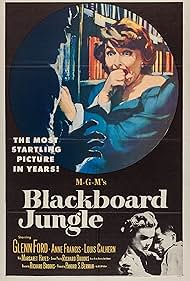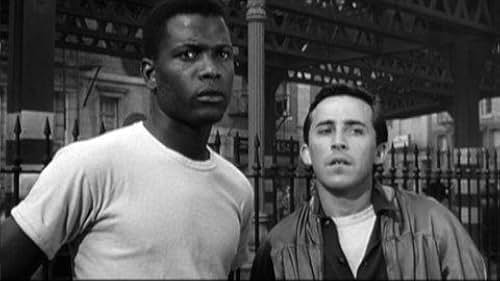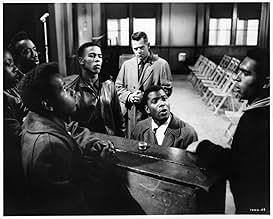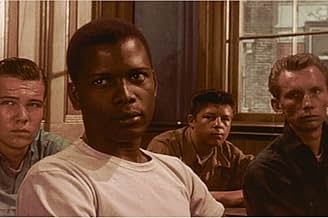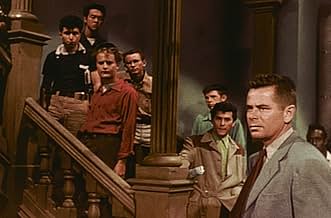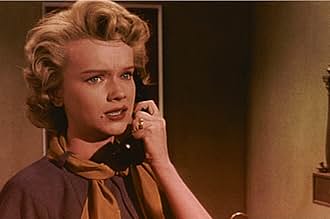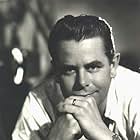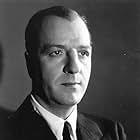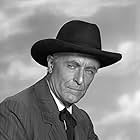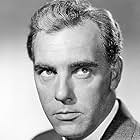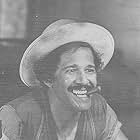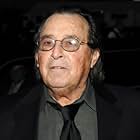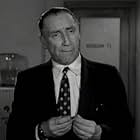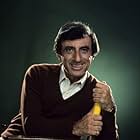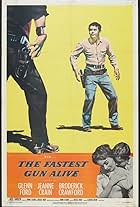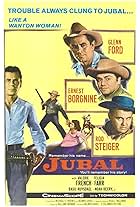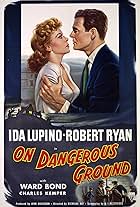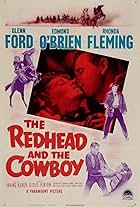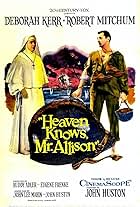A new English teacher at a violent, unruly inner-city school is determined to do his job, despite resistance from both students and faculty.A new English teacher at a violent, unruly inner-city school is determined to do his job, despite resistance from both students and faculty.A new English teacher at a violent, unruly inner-city school is determined to do his job, despite resistance from both students and faculty.
- Nominated for 4 Oscars
- 1 win & 6 nominations total
Jamie Farr
- Santini
- (as Jameel Farah)
David Alpert
- Lou Savoldi
- (uncredited)
- Director
- Writers
- All cast & crew
- Production, box office & more at IMDbPro
Storyline
Did you know
- TriviaClare Boothe Luce, then U.S. Ambassador to Italy, prevented the film from being shown at the Venice Film Festival; and a Senate committee had decided that the film would not have beneficial effects on contemporary youth. Both incidents only served to increase publicity and ticket sales for the controversial movie.
- GoofsIn the garage scene, when Miller starts fixing the car, he says "nobody gives a hoot", but his lips indicates he really says "nobody gives a damn". The replacement of the profanity is made humorous by the director, who chose to play the sound effect of a car horn when the word "hoot" is uttered.
- Quotes
Richard Dadier: Yeah, I've been beaten up, but I'm not beaten. I'm not beaten, and I'm not quittin'.
- Crazy credits"We, in the United States, are fortunate to have a school system that is a tribute to our communities and to our faith in American youth. Today we are concerned with juvenile delinquency -- its causes -- and its effects. We are especially concerned when this delinquency boils over into our schools. The scenes and incidents depicted here are fictional. However, we believe that public awareness is a first step toward a remedy for any problem. Is is in this spirit and with this faith that BLACKBOARD JUNGLE was produced."
- Alternate versionsThe film was originally rejected in the UK for containing "unbridled, revolting hooliganism" and having a "damaging and harmful effect (on teenagers)". Following protests from the distributor, it was viewed again but there was an even split between examiners in favor of banning it again or cutting it for an X (16) certificate. After further meetings where the distributor claimed it had a sincere moral purpose, a cuts list was drawn up which removed around five minutes of footage. This included the following:
- The foreword which absolved the US of blame regarding its realistic depiction - this was added specifically for foreign releases following the huge controversy it caused back home. It reads: "We, in the United States, are fortunate to have a school system that is a tribute to our communities and to our faith in American youth. Today we are concerned with juvenile delinquency -- its causes -- and its effects. We are especially concerned when this delinquency boils over into our schools. The scenes and incidents depicted here are fictional. However, we believe that public awareness is a first step toward a remedy for any problem. It is in this spirit and with this faith that BLACKBOARD JUNGLE was produced."
- Male pupils leering at women.
- A boy assaulting a female teacher.
- Dadier being attacked.
- Dadier being threatened by a knife-wielding pupil.
- The planning and execution of a van robbery.
- Dadier fighting back against a pupil.
- ConnectionsEdited into Heavy Petting (1989)
- SoundtracksRock Around the Clock
Written by James E. Myers and Max Freedman
Performed by Bill Haley and the Comets
Courtesy of Decca Records, Inc.
Featured review
Blackboard Jungle (1955)
There is so much intensity and visual punch to this socially concerned schoolhouse narrative, it's hard to not overlook the pushiness of some of the plot and the blatant stereotyping of most of the characters. Glen Ford is, in fact, truly commanding here, and he becomes the movie. Most of the rest, really all the rest, are supporting roles, and not all of them do him credit. And this comes not from lack of talent, but from a script that has too many little agendas at work. Hey, but they are important and interesting agendas, so fear not. It's exciting going every step of the way.
Even young Sydney Poitier, for all his charm and ease on screen, is forced into a role, as a reluctant but talented student, that makes him a two-dimensional, and his relationship with Ford is pushed on us at the expense of the others. Some of the other teachers are convincing in their own ways, most of all Louis Calhern as a grumpy and jaded older teacher who expects the worst and gets it. There are moments of high drama that work--mostly violence or the avoidance of violence--and there are moments too contrived and too foreshadowed to contribute very much. The female teacher is set up to tempt the determined Ford main character, and she plays out in expected ways.
It might be a testament, actually, that the movie grabs you and won't let go even with these storytelling flaws. For one thing, it looks great (with photography by Russell Harlan) and is edited crisply, so technically it soars (and in a vivid widescreen black and white, not 4:3 like IMDb says). The director, Richard Brooks, clearly makes the most of the material. His career has left us a number of almost great movies, and this might be his greatest. It seems to have had the most impact in its time, sparking violence in the theaters where it was shown. And by using "Rock Around the Clock" it helped make Bill Halley and Comets and white rock and roll hugely popular.
But as just a movie, on the screen, it is Ford who takes on the subtle turmoils going on in his character's head, and you read it in his face and his stiff body language, and you believe him.
There is so much intensity and visual punch to this socially concerned schoolhouse narrative, it's hard to not overlook the pushiness of some of the plot and the blatant stereotyping of most of the characters. Glen Ford is, in fact, truly commanding here, and he becomes the movie. Most of the rest, really all the rest, are supporting roles, and not all of them do him credit. And this comes not from lack of talent, but from a script that has too many little agendas at work. Hey, but they are important and interesting agendas, so fear not. It's exciting going every step of the way.
Even young Sydney Poitier, for all his charm and ease on screen, is forced into a role, as a reluctant but talented student, that makes him a two-dimensional, and his relationship with Ford is pushed on us at the expense of the others. Some of the other teachers are convincing in their own ways, most of all Louis Calhern as a grumpy and jaded older teacher who expects the worst and gets it. There are moments of high drama that work--mostly violence or the avoidance of violence--and there are moments too contrived and too foreshadowed to contribute very much. The female teacher is set up to tempt the determined Ford main character, and she plays out in expected ways.
It might be a testament, actually, that the movie grabs you and won't let go even with these storytelling flaws. For one thing, it looks great (with photography by Russell Harlan) and is edited crisply, so technically it soars (and in a vivid widescreen black and white, not 4:3 like IMDb says). The director, Richard Brooks, clearly makes the most of the material. His career has left us a number of almost great movies, and this might be his greatest. It seems to have had the most impact in its time, sparking violence in the theaters where it was shown. And by using "Rock Around the Clock" it helped make Bill Halley and Comets and white rock and roll hugely popular.
But as just a movie, on the screen, it is Ford who takes on the subtle turmoils going on in his character's head, and you read it in his face and his stiff body language, and you believe him.
- secondtake
- Jul 1, 2009
- Permalink
Details
Box office
- Budget
- $1,168,000 (estimated)
- Runtime1 hour 41 minutes
- Color
- Aspect ratio
- 1.75 : 1
Contribute to this page
Suggest an edit or add missing content

